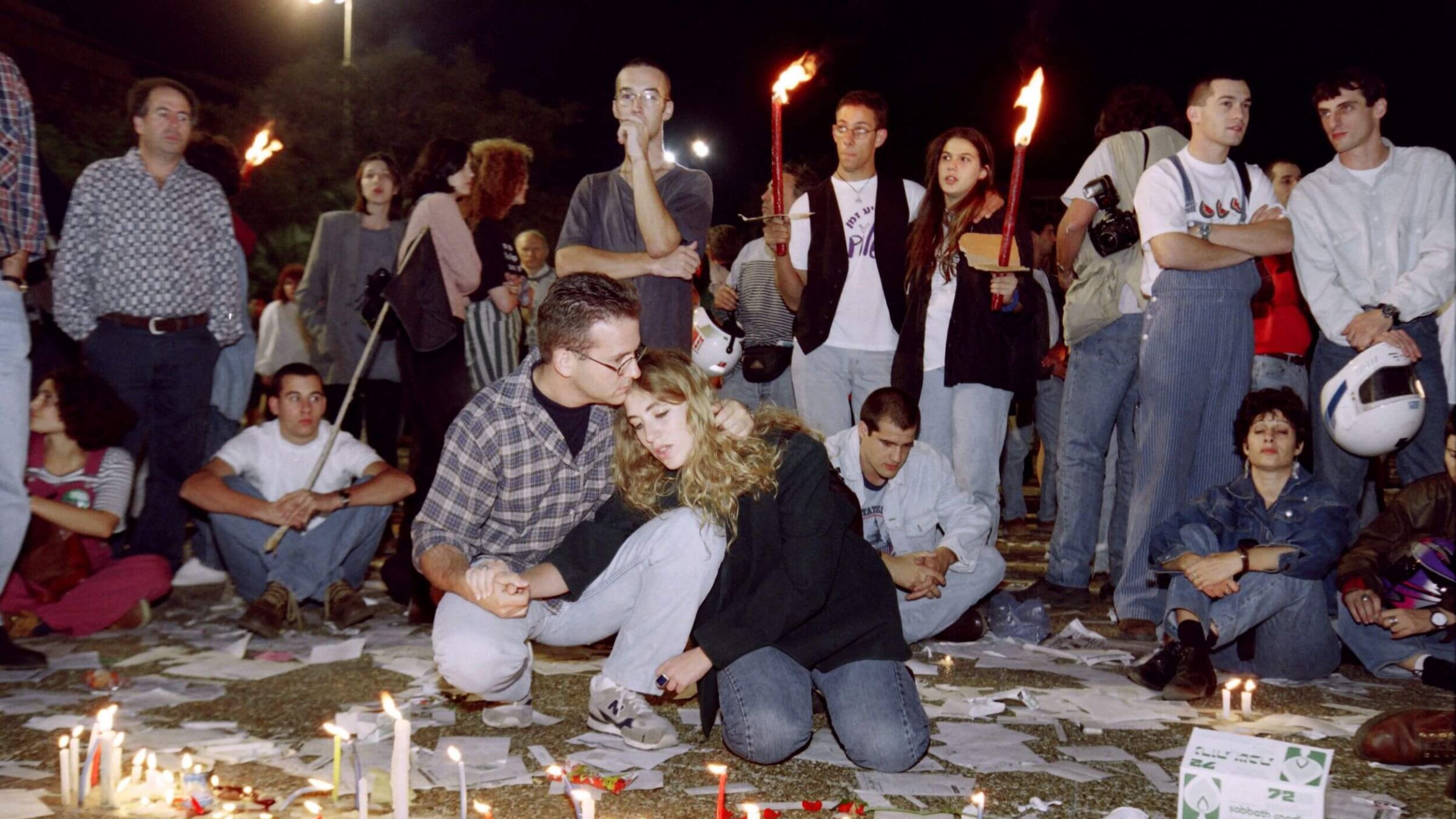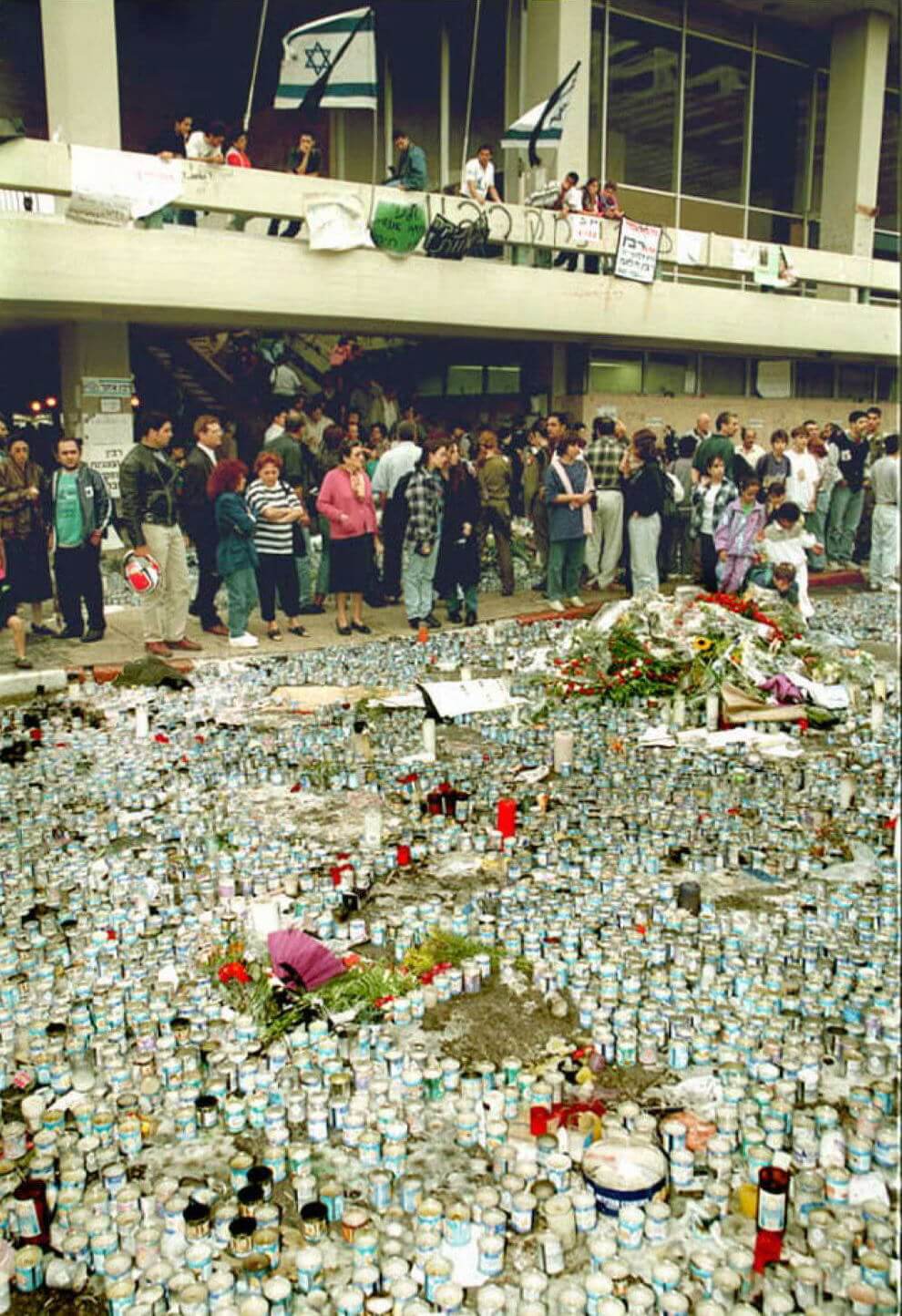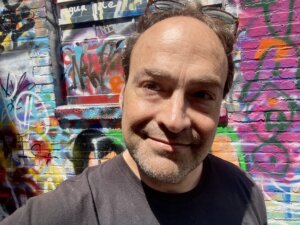First PersonWhen Rabin was assassinated, Israel changed before my eyes
I was backpacking around the Middle East when Yitzhak Rabin was shot. I’ve never forgotten what I saw

In 1995, Israelis mourned for Prime Minister Yitzhak Rabin at the square where he was assassinated in Tel Aviv. Photo by Manoocher Deghati/AFP via Getty Images
The minibus was crammed with Jordanians making their way from the south of the country to Amman. I couldn’t help but wonder why everyone looked so grim. We had departed at dawn, and throughout the three-hour drive, the radio had been dominated by somber discussion. I hadn’t studied any Arabic yet so I couldn’t make out the conversation beyond a smattering of place names: Tel Aviv, Washington, Amman, Al Quds — the Arabic name for Jerusalem.
No one in the minibus said a word, and I didn’t want to break the silence. So I listened to the radio, keeping my ears open for more proper nouns. Peres. Clinton. Hussein. Rabin.
It wasn’t until I walked into the lobby of my hotel in Amman and saw a TV screen showing a photo of Israeli Prime Minister Yitzhak Rabin, along with the text “1922-1995,” that I realized something terrible had happened.
My mind raced through worst-case scenarios — a political assassination by a Palestinian group, a countdown to war, retaliation and counter-retaliation, an inexorable spiral of violence. But when I asked the man behind the check-in counter what had happened, he sounded almost relieved.
“Another Jew” did it, he said, before adding, “So there probably won’t be a war this week.”
I was fresh out of college and had never traveled to the region before. My then-girlfriend (now wife) and I had decided to backpack around Egypt, Jordan and Israel, as the overall political situation had seemed positive — at least when viewed from a distance back home in the United States. The previous year, Rabin, Foreign Minister Shimon Peres and Palestinian President Yasser Arafat had shared the Nobel Peace Prize for the Oslo Accords. Efforts to achieve a two-state solution were moving forward, albeit at a measured pace. It seemed the ideal time to go on a bit of an adventure, and perhaps to feel the hope in the air.
All of those hopes became a blur as we stood in the hotel lobby, trying to figure out what to do next. “There probably won’t be a war this week,” I thought: Instead, an entire country would be sitting shiva, not to mention planning a state funeral for the following day. We made arrangements to go to Jerusalem the next morning.
The road from Amman to Jerusalem by way of the West Bank was nearly deserted. No one spoke a word the entire time, lost in thought, pondering the what-ifs and what-nexts. I expected Israel to be many things, but silent was not one of them.
We arrived ahead of schedule, well before the start of the funeral. As we checked into our new hotel, I asked if it would still be possible to attend the funeral procession, which would begin a few hours later.
“You’re too late,” the clerk told me. “The entire country is already lined up along the route. You might as well watch it on TV at this point.”
I couldn’t just sit there, though. So we left the hotel and began to make our way to the Western Wall.
I’d always imagined my first encounter with Jerusalem’s Old Town would be awash with activity, filled with encounters with street vendors, pilgrims and tourists. Instead the area was nearly deserted. Many shops remained shuttered, save a handful that kept their doors open because they happened to have a TV inside. We stood for a while in one such shop, its owner fidgeting with prayer beads as a small crowd of Palestinian men watched the televised funeral procession in silence.
As we reached the Western Wall, almost no one was present: a smattering of soldiers, a handful of tourists, a davening Haredi man. I ripped two pages from my guidebook and scrawled a pair of prayers on them to tuck between the stones of the wall — one for my grandfather, who had passed away a few years earlier, and one for Rabin. I wish I could remember what I wrote.
After I approached the wall, sirens marking the start of the two minutes of silence began to wail from every direction. The world stopped for two minutes. I stared at the ancient stones, mere inches from my face. Everyone was silent, except for the Haredi man, who continued to quietly pray.

By the time we made it to Tel Aviv several days later, the illusion of normalcy had returned. People walked along the beach and crowded the outdoor cafes, bundled up in sweaters amid an unseasonal chill in the air, until a downpour sent people scattering. As the weather cleared, I decided to visit Kikar Malchei Yisrael, the square where Rabin had just been murdered.
I had expected the crowds of mourners. But it was the thousands of yahrzeit candles that broke my heart. In some places they were laid out in neat rows, surrounded by drenched flowers; volunteers were drying out each candle and attempting to relight them.
People had formed some batches of the candles into Stars of David, doves and peace signs. Around them stood children, families, soldiers, most of them quietly grieving. A pair of students sat cross-legged on the wet pavement, engaged in a passionate debate. I couldn’t understand what they said, but the heightened tone of their exchange carried the weight of their worries about the future.
At some point I began reciting Kaddish to myself. People began photographing me, which struck me as odd, until I recalled that I had been doing exactly the same thing to others just a few minutes earlier. I then collected some candles and reassembled them in the form of chai, the Hebrew word for “life.”
I lingered for a while before departing, but returned later that afternoon. The two students were still there.
In the 30 years since that awful week, I’ve thought about them periodically. At the time, they seemed painfully aware their lives had been irrevocably altered by what had transpired, that their hopes and dreams had died alongside Rabin himself.
They must be approaching 50 years old. Have the intervening years been kind to them? Have they prospered, or wasted the decades embittered by the consequences of that seminal moment of their lives, and the life of their country? Have they served in wars, protested against them, or both?
Assuming they are even still alive, do they think about that day each year and feel their heart break all over again like mine does?
And will they, too, light a yahrzeit candle tonight in Rabin’s memory, and for the lost promise of what could have been?

















